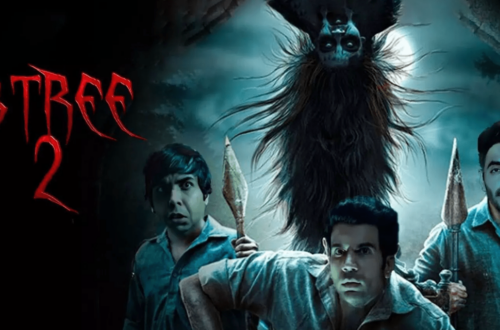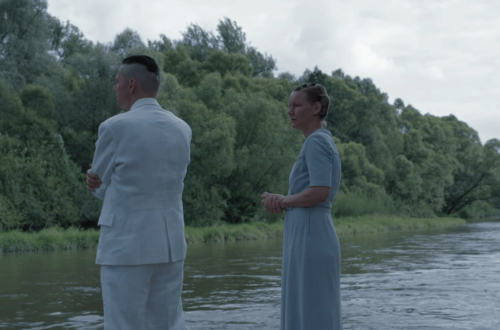Stream Movie Review: A film like Michael Leavy’s Stream will always pique my interest as a horror aficionado. The unsettling allure of forbidden internet content and the quest for social media fame amplify the genre’s themes. The screenplay captures the addictive game show essence, drawing from influences like Death Race, Hostel: Part III, and various slasher films, with a nod to Saw. Leavy’s approach to terror, which leverages sensational violence for mass appeal, faces the challenge of standing out in a genre saturated with similar streaming massacre narratives. The comparison reveals that Stream struggles to carve out a distinctive niche.
Stream (2024)
- Genre: Horror, Action, Thriller
- Plot: The film follows a family’s ill-fated attempt to reconnect during a weekend getaway, which turns into a nightmare when they are trapped in a hotel with four sadistic killers. These killers are engaged in a deadly competition to create the most gruesome murders, forcing the family to fight for survival as the killers unleash their twisted games.
- Release Date: August 21, 2024
- Director: Michael Leavy
- Cast: Jeffrey Combs, Danielle Harris, Dee Wallace, Felissa Rose, Daniel Roebuck, Tony Todd, Dave Sheridan, Jason Leavy, David Howard Thornton, Liana Pirraglia, Mark Haynes, Terry Kiser, Phuong Kubacki, Tim Reid, Mark Holton, Kimberley Crossman, Damian Maffei, Isla Cervelli, Wesley Holloway, Charles Edwin Powell, Sydney Malakeh, Andrew Rogers, Michael Leavy, Linden Porco
- Runtime: 123 Minutes
- Writers: Steven Della Salla, Jason Leavy, Michael Leavy, Robert Privitera
What Is ‘Stream’ About?
Stream kicks off in a similar vein to Hellbender, with a flashback to 1814 where Napoleon’s starving soldiers encounter a sinister woman offering them a horse. The disturbing events that follow set a grim tone, and the film quickly shifts to the present day, where Roy Keenan (Charles Edwin Powell) and his family check into The Pines hotel. They hope for a pleasant vacation but soon discover the hotel’s exits are locked and psychotic killers in color-coded masks are using the hotel as their hunting ground. As the family attempts to navigate this nightmare, the film reveals the killers’ game and the family’s desperate struggle for survival.
Stream fits into the “Body Count” subgenre, reminiscent of Terrifier. Characters are primarily present to be slaughtered, with minimal development or backstory. The killers, labeled simply as “Player 1” and so on, and the concept of viewers placing bets on which victim will die first, are presented without much depth. The film’s focus is on the violent spectacle, with Mark Haynes’ Player 4 crushing skulls and David Howard Thornton’s Player 2 engaging in macabre games with abdominal flesh. Leavy’s approach blends grotesque humor with low-budget thrills, but it doesn’t reach the heights of indie hits like The Funhouse Massacre.
‘Stream’ Is a Horror Movie That Boasts Great Practical Effects
Fortunately, Damien Leone, known for his work on Terrifier, brings his practical effects expertise to Stream. The gore scenes are highlighted by inventive use of power drills, arcade joysticks, and various forms of ocular mutilation. While the film doesn’t quite reach the intensity of Terrifier or Terrifier 2, it offers a sleazy, gory experience with a variety of brutal effects. Leavy channels the “Golden Age” horror ethos, prioritizing over-the-top deaths over deep storytelling. Despite the film’s overextended runtime, the practical effects remain a strong point.
The film features a star-studded cast of genre veterans. Jeffrey Combs stands out as Mr. Lockwood, providing a touch of his signature madness. Danielle Harris plays Roy’s wife Elaine, delivering her lines with commitment despite their cliché nature. Dave Sheridan adds some humor as The Pines’ bartender. However, other well-known actors like Felissa Rose, Dee Wallace, and Bill Moseley have minimal roles, which doesn’t add much to the overall impact.
Expectations for standout performances from the cast are tempered by stereotypical roles and a lack of engaging character development. Characters often disappear for extended periods, and the film’s central concept—a clandestine slasher betting ring—feels underdeveloped. The third-act twist aims for dramatic impact but falls flat due to the lack of empathy built for the Keenan family. Leavy’s focus on maintaining a high body count overshadows the film’s potential, making the two-hour runtime feel excessive for a movie more concerned with style than substance.
Stream struggles with pacing and fails to capitalize on its concept’s potential. Its bloated narrative, unexplained quirks, and meandering plot detract from what could have been a more engaging experience. There might be a tighter version of Stream out there, but unfortunately, it isn’t present in this iteration.





